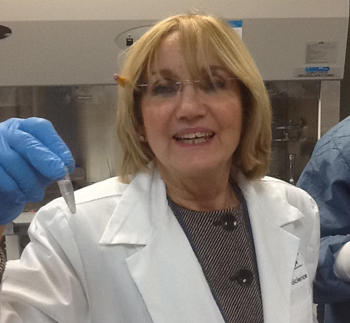Grantee Spotlight: Marta Torroella-Kouri, Ph.D. – Studying the Role of Obesity and Breast Fat Tissue Inflammation in African American Women with Breast Cancer
, by CRCHD staff
Marta Torroella-Kouri, Ph.D., Associate Professor of Microbiology & Immunology at the University of Miami School of Medicine, is studying the role of obesity and breast fat tissue inflammation in breast cancer. A CRCHD-NCI R21 grantee, Torroella-Kouri is hoping to understand the role breast adipose tissue inflammation plays in breast cancer development in obese patients from diverse racial/ethnic backgrounds.
“It is our hope that our research will lead to new breast cancer prevention approaches and therapeutic alternatives for overweight/obese women, especially among African Americans and Latinas, characterized by a high prevalence of obesity and who also have more aggressive breast cancers with the worst prognoses,” she said. Torroella-Kouri is studying the inflammatory response in breast adipose tissue in obese women through two CRCHD-funded R21s.
According to Torroella-Kouri, the role of chronic inflammation in cancer was first recognized by Rudolf Ludwig Carl Virchow, M.D., a German pathologist who described the presence of leukocytes in human tumors in the 19th century. She explained, “Chronic inflammation plays a role in the different stages of the carcinogenesis process (the initiation, promotion and progression of cancer in the body), as well in most of the chronic diseases of our times. She continued, “Macrophages are one of the most important players in the inflammatory response and are the immune cells most frequently seen in tumor microenvironments. Our present goal is to determine if decreasing this inflammation using a new anti-inflammatory drug that we are studying, will control breast cancer progression and show macrophages less in number and less inflammatory.”
Obese people are prone to chronic inflammation because they accumulate fatty tissue around their abdominal organs (abdominal or visceral fat). This fat tissue becomes inflamed and accumulates high numbers of inflammatory macrophages, which together with adipocytes pump pro-inflammatory cytokines, chemokines, adipokines and other pro-inflammatory mediators into the blood, thus contributing to a low-level, systemic inflammation. Obesity, therefore, is clearly “generating systemic inflammation” in breast cancer patients, said Torroella-Kouri.
“Importantly, she points out, “our work in obese females has shown that breast adipose tissue cross talks with tumor cells, resulting in the recruitment of more macrophages, and thus generating a local inflammatory microenvironment in the breast tumor, further contributing to breast cancer progression.”
Obese fatty tissue produces estrogen particularly in postmenopause, which in turn drives the majority of breast cancers (which are estrogen receptor positive or ER+). Torroella said, “Obesity,” Torroella-Kouri said, “is associated with increased risk of breast cancer in post-menopausal women.” Obesity is also associated with poor breast cancer prognosis in women of all ages, regardless of their menopausal status,” she added.
Torroella-Kouri recently presented her findings in human breast cancer, macrophages, and ethnicities at the American Association for Cancer Research (AACR) Annual Meeting 2015 in Philadelphia. She reported on macrophages having a prognostic factor in the breast tumor microenvironment and variances among race/ethnicity, such as African Americans and Latinas (two population groups in which she found a significantly high number of macrophages and inflammatory crown-like structures in breast cancers compared to Caucasians). She also presented data from a pilot study (funded by a Minority Supplement to her CRCHD-funded R21) that demonstrates for the first time that breast cancer-associated macrophages undergo proliferation, and that they do so at different rates across ethnicities. Findings from her R21 study suggest that African-American breast tumors have higher numbers of macrophages because they proliferate at a higher rate than other population groups.
Torroella-Kouri’s interest in health disparity research is a personal one. “We believe exploring non-genetic biological differences may explain disparities in aggressive patterns of breast cancers found in African Americans and Latinas,” Torroella-Kouri said. “My interest stems from being a Latina, and realizing that I can make a difference in the understanding of this important area of research.”
Torroella-Kouri credits NCI CRCHD as being instrumental in developing her career. “It is very hard to start your career from scratch a second time in life, especially when you previously had a productive career.” She added, “Thanks to the support provided by NCI CRCHD, I was able to reorient my career, reinitiate my work in cancer research, and organize my own laboratory in the U.S.”
For others interested in pursuing a career in the biomedical sciences, Torroella-Kouri offers some advice, “Work hard; believe in yourself. The sky is your ceiling; never give up.”
